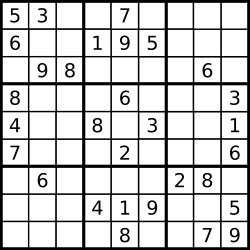递归程序实例
来源:互联网 发布:淘宝粉丝怎么看 编辑:程序博客网 时间:2024/06/03 21:30
1.Valid Sudoku
There are just 3 rules to Sudoku.



Determine if a Sudoku is valid, according to: Sudoku Puzzles - The Rules.
The Sudoku board could be partially filled, where empty cells are filled with the character'.'.

A partially filled sudoku which is valid.
当然这里用不到递归,下面的问题就要用到递归了。看起来比较复杂,实际比较简单,根据规则进行判断就行了。这里判重采用的map的方式
代码:
public class Solution { //置为静态变量 static Map<Character,Integer> map = new HashMap<Character,Integer>(); public boolean isValidSudoku(char[][] board) { //判断每行 for(int i = 0; i < board.length; i++){ initMap();//每次均需初始化 for(int j = 0; j < board[0].length; j++){ //是数字 if(board[i][j] >= '0' && board[i][j] <= '9'){ if(map.get(board[i][j]) > 0){//说明重复数字 return false; }else{ map.put(board[i][j],1); } }else if(board[i][j] != '.'){//出现空格和0-9之外的字符 return false;//直接返回false } } } //判断每列 for(int i = 0; i < board[0].length; i++){ initMap();//每次均需初始化 for(int j = 0; j < board.length; j++){ //是数字 if(board[j][i] >= '0' && board[j][i] <= '9'){ if(map.get(board[j][i]) > 0){//说明重复数字 return false; }else{ map.put(board[j][i],1); } }else if(board[j][i] != '.'){//出现空格和0-9之外的字符 return false;//直接返回false } } } //判断九宫格 for(int i = 0; i < board.length - 2; i = i+3){//行{ for(int j = 0; j < board[0].length - 2; j=j+3){ initMap();//初始化 for(int m = i; m < i + 3;m++){ for(int n = j; n < j+3; n++){ //是数字 if(board[m][n] >= '0' && board[m][n] <= '9'){ if(map.get(board[m][n]) > 0){//说明重复数字 return false; }else{ map.put(board[m][n],1); } }else if(board[m][n] != '.'){//出现空格和0-9之外的字符 return false;//直接返回false } } } } } return true; } //初始化map为每个key均赋值0 private void initMap(){ for(char i = '0';i <= '9'; i++){ map.put(i,0); } }}2.Sudoku Solver
Write a program to solve a Sudoku puzzle by filling the empty cells.
Empty cells are indicated by the character '.'.
You may assume that there will be only one unique solution.

A sudoku puzzle...

...and its solution numbers marked in red.
这里是要求求出具体的方案,思路跟八皇后问题是一样的。递归处理即可。
class Solution {public: bool dfs (vector<vector<char> > &board, int i, int j, int n ) { //函数写成return bool型,这样在找到第一个解的时候return. if (j >= n) { return dfs(board, i+1, 0, n); } else if (i == n){ return true; } else if (board[i][j] != '.'){ return dfs(board, i, j+1, n); } else { for (int k = 1; k <= n; ++k){ board[i][j] = (char)('0' + k); if (isValid(board, i, j, n)){ if (dfs(board, i, j+1 , n)) // 如果找到第一个解,就及时return return true; } board[i][j] = '.'; } } return false; } bool isValid(vector<vector<char>> &board, int i , int j, int n) { for (int index = 0; index < n; ++index){ if (index != j && board[i][index] == board[i][j]) { return false; } } for (int index = 0; index < n; ++index){ if (index != i && board[index][j] == board[i][j]) { return false; } } int index_i = i / 3; int index_j = j / 3; for (int x = index_i * 3; x < index_i * 3 + 3; ++x) { for (int y = index_j * 3; y < index_j * 3 + 3; ++y) { if ((x!=i || y != j) && board[x][y] == board[i][j]) { //注意这里逻辑是"或"||,不是"与" return false; } } } return true; } void solveSudoku(vector<vector<char> > &board) { if (board.size() == 0 || board[0].size() == 0) return; dfs(board, 0, 0, 9); }};3.N-Queens
The n-queens puzzle is the problem of placing n queens on ann×n chessboard such that no two queens attack each other.

Given an integer n, return all distinct solutions to the n-queens puzzle.
Each solution contains a distinct board configuration of the n-queens' placement, where'Q' and'.' both indicate a queen and an empty space respectively.
For example,
There exist two distinct solutions to the 4-queens puzzle:
[ [".Q..", // Solution 1 "...Q", "Q...", "..Q."], ["..Q.", // Solution 2 "Q...", "...Q", ".Q.."]]
可以有不同的方法,一种方法就是同第2题中的方法一样,每个位置进行递归,这样需要有一个棋盘,浪费了一定的空间,但是比较好理解;第二种方法,把每一行所放置的数字连起来可以看成N个数字的排列。关于生成排列的几种算法可以参考《排列组合程序》。
代码如下:
public class Solution { public List<List<String>> solveNQueens(int n) { ArrayList<List<String>> res = new ArrayList<List<String>>(); int[] nums = new int[n]; for(int i = 0;i<n;i++) nums[i] = i; helper(nums,0,res); return res; } public void helper(int[] nums,int pos,List<List<String>> res){ if(pos == nums.length){ save(nums,res); return; } for(int i = pos;i < nums.length;i++){ swap(nums,pos,i); if(isValidate(nums,pos)) helper(nums,pos+1,res); swap(nums,pos,i); } } public void save(int[] nums,List<List<String>> res){ ArrayList<String> tmp = new ArrayList<String>(); for(int i = 0;i < nums.length;i++){ StringBuilder sb = new StringBuilder(); for(int j = 0;j < nums.length;j++){ if(nums[i] != j) sb.append("."); else sb.append("Q"); } tmp.add(sb.toString()); } res.add(tmp); } public void swap(int[] nums,int i,int j){ int tmp = nums[i]; nums[i] = nums[j]; nums[j] = tmp; } public boolean isValidate(int[] nums,int pos){ for(int i = 0;i < pos;i++){ if((i+nums[i] == pos+nums[pos]) || (i-nums[i] == pos-nums[pos])) return false; } return true; }}4.N-Queens II
Follow up for N-Queens problem.
Now, instead outputting board configurations, return the total number of distinct solutions.

同上一道题一样,代码如下:
public class Solution { private int count = 0; public int totalNQueens(int n) { int[] nums = new int[n]; for(int i = 0;i<n;i++) nums[i] = i; helper(nums,0); return count; } public void helper(int[] nums,int pos){ if(pos == nums.length){ count++; return; }else{ for(int i = pos;i < nums.length;i++){ swap(nums,pos,i); if(isValidate(nums,pos)) helper(nums,pos+1); swap(nums,pos,i); } } } public void swap(int[]nums,int i,int j){ int tmp = nums[i]; nums[i] = nums[j]; nums[j] = tmp; } public boolean isValidate(int[] nums,int pos){ for(int i = 0;i < pos;i++) if((i+nums[i] == pos+nums[pos])||(i-nums[i] == pos-nums[pos])) return false; return true; }}- 递归程序实例
- 递归实例
- 递归实例
- 递归实例
- 递归程序
- CTE 递归应用实例
- java递归实例
- 递归简单实例
- abap 递归 问题实例
- 递归的简单实例
- 递归的两个实例
- 递归的一个实例
- 递归调用实例
- TinyXML 递归遍历实例
- shell 递归调用实例
- 实例解析递归
- C#递归实例介绍
- makefile递归调用实例
- 区间调度问题详解
- 简单的倒计时软件的开发过程及心得
- unity 在移动平台中,文件操作路径详解
- css选择器
- 基于UDP协议的网络编程
- 递归程序实例
- Http-长连接
- HDU 2084 数塔
- 1011. A+B和C (15)
- javascript closure
- linux之间传送文件
- Java中ArrayList与LinkedList的区别
- 华为2015实习上机:字符串排序
- pomelo chatroom


